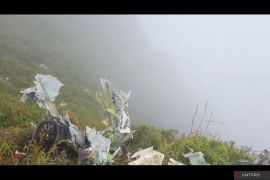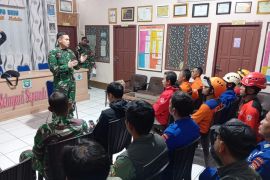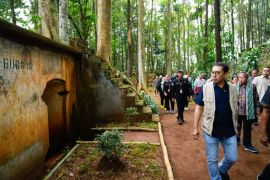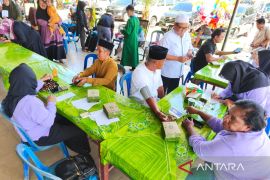In shattered towns along the vast Pacific coast -- where a massive tidal wave devoured and spat out entire neighbourhoods with houses, cars and people -- an eerie calm had descended over the muddy wastelands.
Birds were chirping in the new mudfields near Minamisoma, where the deadly wall of seawater surged as far as two kilometres (1.2 miles) inland, leaving random debris, vehicles and the ruins of wood houses jutting from the mud.
Sayori Suzuki, a 34-year-old housewife, recalled the utter horror of the previous day, Japan`s worst recorded quake.
"It was a tremor like I never experienced before," she told an AFP reporter. "My son cried violently and things just flew from the shelves.
"My house is okay, but a relative`s house was washed away. Another relative said he was fleeing in a car but watched in the rear-view mirror as the waves were catching up on him from behind. He escaped very narrowly."
As if the near-apocalyptic destruction and frequent nerve-wracking aftershocks were not enough, a new threat emerged as authorities evacuated tens of thousands of residents living near two ageing inland nuclear plants.
Japan worried about a meltdown at the Fukushima No. 1 reactor, 250 kilometres (160 miles) northeast of Tokyo, where the cooling system broke and fire engines were pumping water to douse superhot radioactive fuel rods.
An explosion was later reported there.
The cooling system was also damaged by the quake in another plant, the Fukushima No.2 reactor -- a very personal issue for the Suzuki family.
"My brother works at the Fukushima No.2 nuclear power plant," said Suzuki.
"He worked all through the night. I`m so worried about him because of the risk of radiation exposure."
Other survivors voiced shock at the monster quake that has left more than 1,000 people feared dead, upending countless lives and stunning the world with its massive scale of destruction, some of it caught on television.
A 35-year-old factory worker said he was at his plant when "the tremor hit suddenly... The slow swaying turned into big vertical shakes. The tremor continued for about five minutes. I was hardly able to keep standing."
Then, he told AFP, inside the cast mould plant where he worked, "two furnaces exploded, one after another. We could also hear explosions from nearby factories."
The towering wall of water generated by the 8.9-magnitude quake -- the seventh biggest in world history -- pulverised the northeastern city of Sendai, where police said 200 to 300 bodies had washed up.
Lucky survivors, aided by thousands of soldiers, looked for missing loved ones in the hardest hit areas such as Miyagi and Iwate prefectures.
"There are so many people who lost their lives," an elderly man told TV reporters before breaking down in tears. "I have no words for this."(*)
Editor: Aditia Maruli Radja
Copyright © ANTARA 2011











